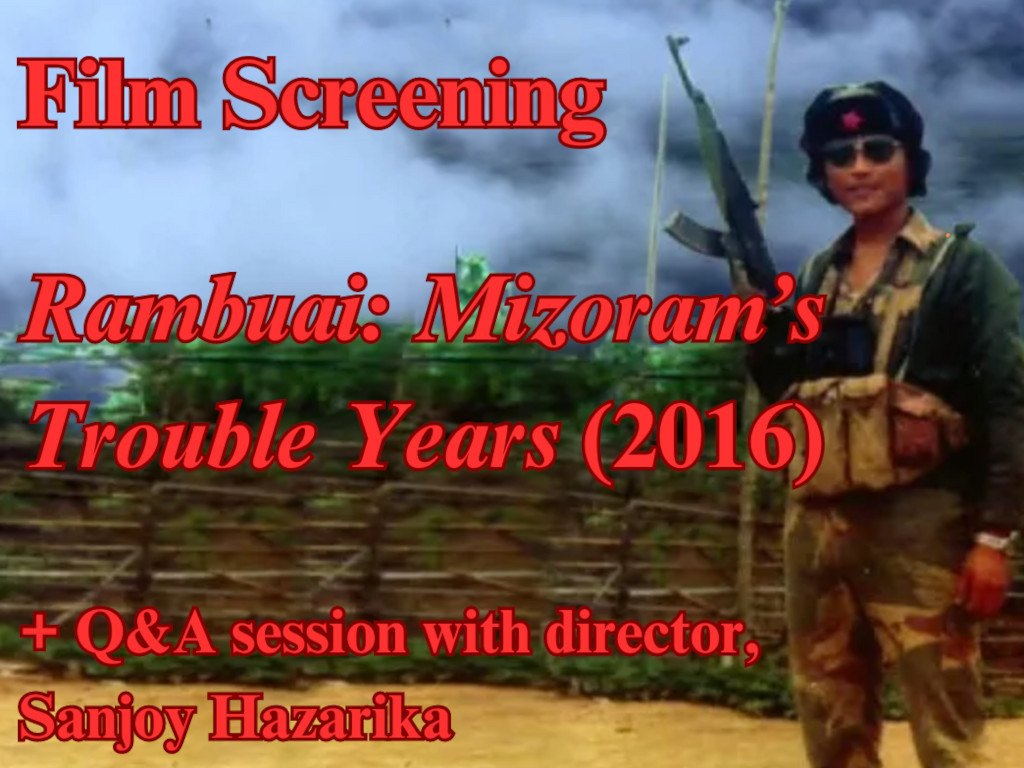Film Screening: „Rambuai: Mizoram’s Trouble Years“ (2016) with a Q&A session with the director Sanjoy Hazarika
India’s northeast has seen a long and troubled history where questions of belonging and identity have become sites of violent conflict. In Sanjoy Hazarika’s 45 min film Rambuai, we are confronted by the violence in the state of Mizoram which saw a period of intense conflict and strife from 1966 to 1986. Hazarika’s film, which premiered in 2016, delves into this dark history. In today’s context this film gains prominence as it captures the much-needed nuance about the region, especially in light of the refugee crisis in Myanmar and political turmoil in Manipur since the summer of last year. The film screening will be followed by a Q&A session with Hazarika.
Rambuai: Mizoram’s Trouble Years documents the story of armed uprising and violence in the state, how finally peace was made, and how people in Mizoram today talk (or decide not to talk) about this traumatic period of their history. Made under a project of the Centre for North-East Studies and Policy Research of Jamia Millia Islamia University in Delhi, the makers interviewed more than dozen of people from different walks of life who lived during the traumatic period after 1959, when a famine took place in Mizoram; the experience of it, and the inability of the Indian state to properly handle the resulting crisis, led to the armed insurrection in 1966. Film preparation also included research on the literature of Mizo history specifically focusing on the Rambuai years; two well-known Mizo scholars, Margaret Ch. Zama, Mizoram University and C. Lalawmpui Vanchiau.
Sanjoy Hazarika combines roles as researcher, columnist, mentor and practitioner. He is a former reporter for the New York Times. In 2000, Hazarika founded the Centre for North East Studies and Policy Research whose flagship programme is the innovative fleet of boat clinics on the Brahmaputra valley (www.c-nes.org). He is engaged with river-related including climate uncertainty and its impacts on governance and livelihoods. Between 2016-2022 he was international director of the Commonwealth Human Rights Initiative (CHRI) which has worked extensively on police, prison reforms and Right to Information. Author of five books, Hazarika has just completed a travelogue on his journeys on the Brahmaputra – from Tibet to the Bay of Bengal -- and is writing a new book on Mizoram state of the NER. His books include Bhopal, the lessons of a Tragedy (Penguin), Strangers of the Mist (Penguin) on conflicts in the North East and its neighborhood and its successor, Strangers No More (Aleph). He has also co-edited several books including Hope Behind Bars (Pan MacMillan) and Japan and India’s North East: Engagement through connectivity (Routledge). His essays have appeared in peer reviewed journals, collections and anthologies including the Routledge Companion to the North East. Hazarika has scripted and produced over a dozen documentaries including on the Brahmaputra River, river dolphins and on governance and conflict.
Event Type
Subject Field
Faculty
More Information
Organizer
Location
Nansenstraße 2
12047 Berlin

